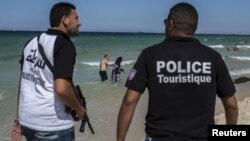Tunisia's president has extended by two months the state of emergency he imposed after a gunman killed 38 tourists in June at a Mediterranean beach resort in the North African nation.
President Beji Caid Essebsi's office said the decision was made after consultations with the prime minister and the speaker of parliament.
The order was first imposed on July 4, days after the attack that killed mostly British tourists in the seaside city of Sousse. In March, two gunmen also killed 21 foreign tourists and a policeman at the Bardo Museum in the capital, Tunis.
The Islamic State jihadist group's claim that it carried out both attacks prompted Tunisia's parliament to pass a new anti-terror law earlier this month.
Rights group
Human Rights Watch criticized the bill for strengthening authorities' power to make arrests.
HRW said it "would open the way to prosecuting political dissent as terrorism, give judges overly broad powers and curtail lawyers' ability to provide an effective defense."
Tunisia is the only country that emerged with democratic rule after the uprisings of the Arab Spring four years ago.
However, with attacks by Islamic radicals on the rise, the new government appears to increasingly consider stability and security over personal freedoms.





